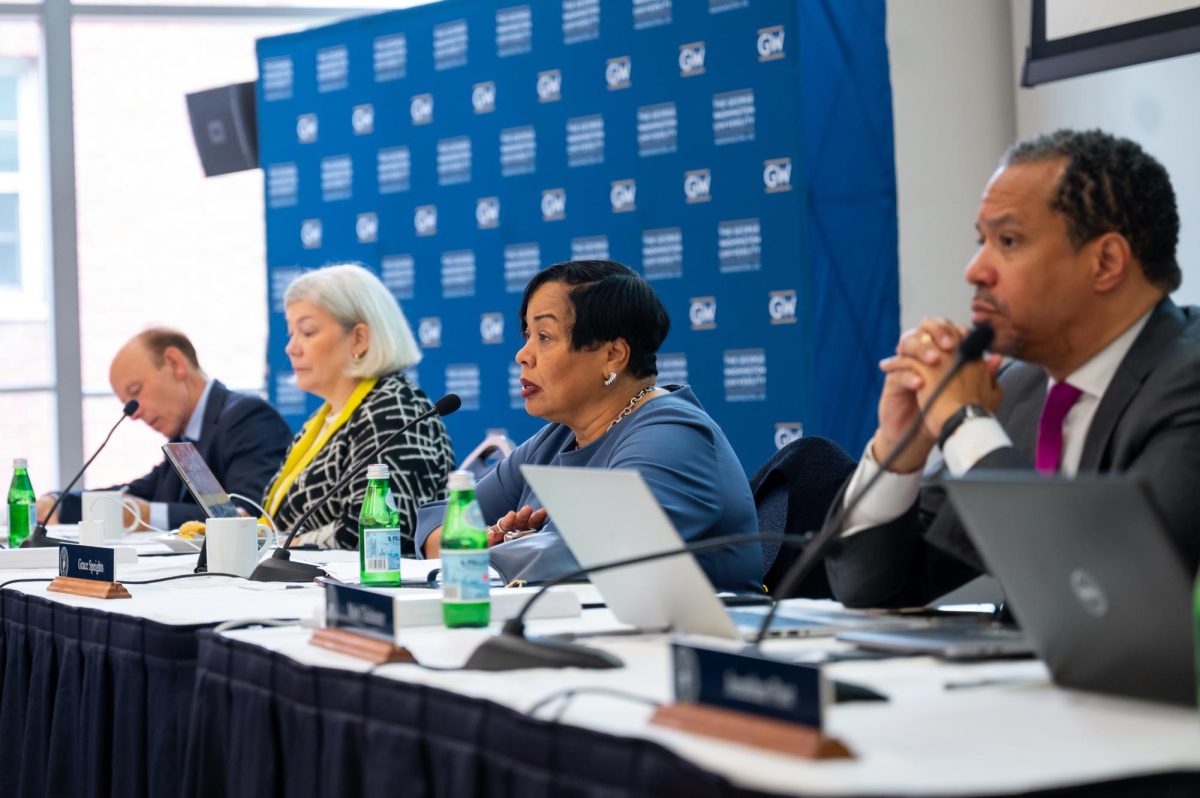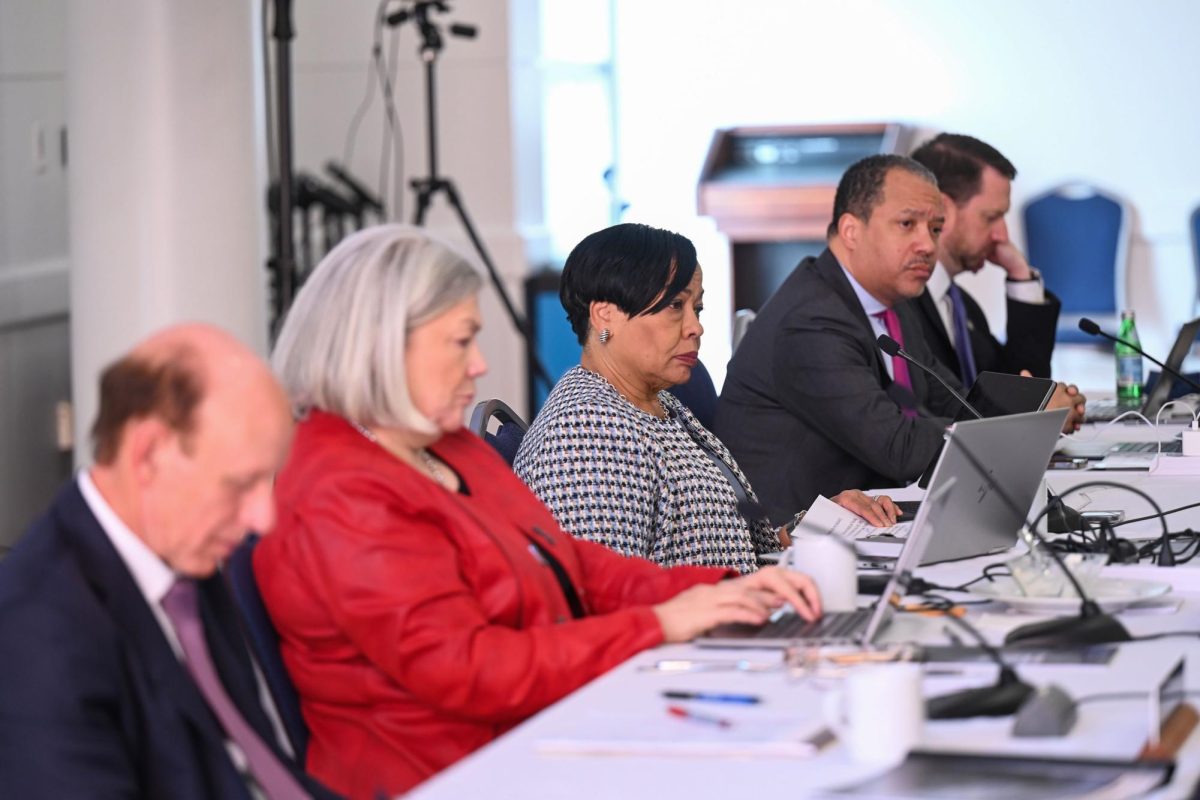Following weeks of outcry toward the University’s response to student protests on campus, the leader of the Board of Trustees reaffirmed her trust in University President Ellen Granberg at a meeting Friday, who then announced plans to create a website this summer to display publicly available financial documents.
Board Chair Grace Speights said she was thankful for Granberg’s leadership during a “profoundly” challenging time in University history. She said she understands there are a range of perspectives and opinions about the events of the “preceding weeks,” adding that she has “great faith” that the GW community will recover from recent on campus tensions.
“It will take time to heal, and we are grateful for President Granberg’s leadership over the long road ahead,” Speights said.
She did not directly mention the encampment that remained in University Yard for two weeks that called on officials to disclose investments and divest from companies supplying arms to Israel. After police cleared the encampment, arresting 33 protesters, University officials said they refuse to change their endowment investment strategies, academic partnerships or student conduct processes.
Granberg said the website, planned to release in the late summer, is a step toward providing the community with “greater clarity” on the University’s investments and finances and will allow people to send GW finance officials questions about the information. GW currently publicizes the University’s annual financial statements, credit rating agency reviews and endowment reports but does not report how much money GW has invested in outside companies or which companies they are invested in.
In the past few weeks, Granberg and trustees have received an enormous amount of pressure from students and faculty about the University’s handling of the encampment protest, matching the backlash toward other university presidents following pro-Palestinian demonstrations on their campuses. The Board of Trustees chair at Columbia University supported the president following calls for her resignation. At other universities like the University of Pennsylvania, the board chairs resigned alongside their president.
Granberg said she conversed with community members over the last few days about how they feel officials broke their trust because they allowed the Metropolitan Police Department to arrest students, while others are upset that the encampment lasted almost two weeks.
“In all these cases and on all sides of the event, there’s rebuilding to do, and we’re committed to doing that important work,” Granberg said at the meeting. “I am personally committed to doing that important work.”
She said moving forward, the University will continue to protect free speech while outlining limitations to free expression on campus. Granberg and other officials met with student organizers twice after MPD cleared the encampment and said they plan to continue conversations with the student representatives and a “full array” of other groups impacted by “recent events” in a University release.
Granberg said officials will use the framework of the three-part community plan that launched in January to help GW emerge from tensions sparked by recent protests. The plan outlines educational programming for handling University life during times of conflict by fostering productive dialogue, strengthening partnerships and increasing support for those affected by the war in Gaza.
“We’re also taking steps to engage GW’s incredible faculty around ways that we can use their elected expertise to inform and support humanitarian relief efforts in Gaza and in other parts of the world experiencing humanitarian crises,” Granberg said but didn’t specify what steps.
Granberg’s announcement comes after members of the Faculty Senate criticized the absence of faculty involvement in GW’s handling of the encampment last Friday, saying that professors’ relationships with students and expertise in their fields of study could have aided officials in their decisions.
Arielle Geismar and Ethan Fitzgerald, the former and current Student Government Association presidents, respectively, urged the Board to add voting students to the governing body so trustees can understand students’ biggest issues. Geismar and Fitzgerald also said they supported increased University financial transparency.
Geismar said administrators knowingly endangered students when they allowed MPD to clear the encampment, given the police violence that has occurred at other universities when the police swept protests. Geismar stood up while saying that she “begged” for conversations with administrators throughout the two weeks of the encampment.
“I was taking meetings with students who were crying, I was coordinating academic support with peers and mental health services,” Geismar said. “Where was GW? As an institution, we have failed our students.”
Fitzgerald, who joined the meeting virtually, said he is advocating for the University to create a working group of students from “diverse perspectives” to ensure GW is safe harbor for free speech and dialogue during his 2024-25 term but also one where students understand restrictions on these rights.
Fitzgerald asked trustees to address GW’s underfunding of the Multicultural Student Services Center, which students say has left the center unable to support cultural student organizations. He also encouraged the Board to reevaluate the University’s tuition by reassessing its former fixed tuition policy that guaranteed students a single fixed tuition rate for up to 10 consecutive semesters.
“As people are trying to navigate choosing colleges, as they’re trying to navigate the journey of affordability here at GW, this would be integral to making that possible for students,” Fitzgerald said.
Speights did not address specific concerns brought forward by Geismar and Fitzgerald and instead thanked them for their comments.
Staff Council President Bridget Schwartz said she has heard from staff that they did not feel safe and were met with “discrimination” throughout the encampment. She criticized the lack of communication from administrators, adding that staff found out information about the encampment from social media and The Hatchet’s reporting instead of through the University.
“This lack of transparency added to the feeling of being unsafe,” Schwartz said.
Faculty Senate Executive Committee Chair Ilana Feldman said in her report that the senate has not received a large amount of responses in the portal that it created for faculty to report concerns about their ability to exercise their academic freedom, which shows that most faculty feel positively about the overall state of academic freedom at GW. Feldman said the reports that have been filed have been “overwhelmingly” connected to concerns about speaking on matters related to the war in Gaza.
Feldman also restated faculty members’ call for involvement in the University’s decision making on major issues facing the community, like the handling of the encampment.
“This is something that I think we need to pay attention to make sure that everybody, students and faculty, feels free to discuss a broad range of issues,” Feldman said.
Secretary Avram Tucker said that the University’s endowment, a financial foundation composed of real estate, investments and donations, is continuing to rise to $2.8 billion from $2.6 billion in February. He said the endowment is currently the highest it has ever been in GW history.
Alumni Association President Maxwell Gocala-Nguyen announced that the University renewed his term as president for a second year, despite being originally elected to a one-year term. He also said the association is approaching its $12.9 million attainment goal and recently surpassed $11 million, with the rest of May and June ahead before the end of FY 2024 to reach the goal.
He added that he is unsure if or how campus protests will affect their fundraising, but the association will adapt accordingly. He also said the association surpassed their annual April Giving Day goal, setting a new record with almost 3,500 donors and raising close to $1.9 million.
Fiona Riley contributed reporting.








